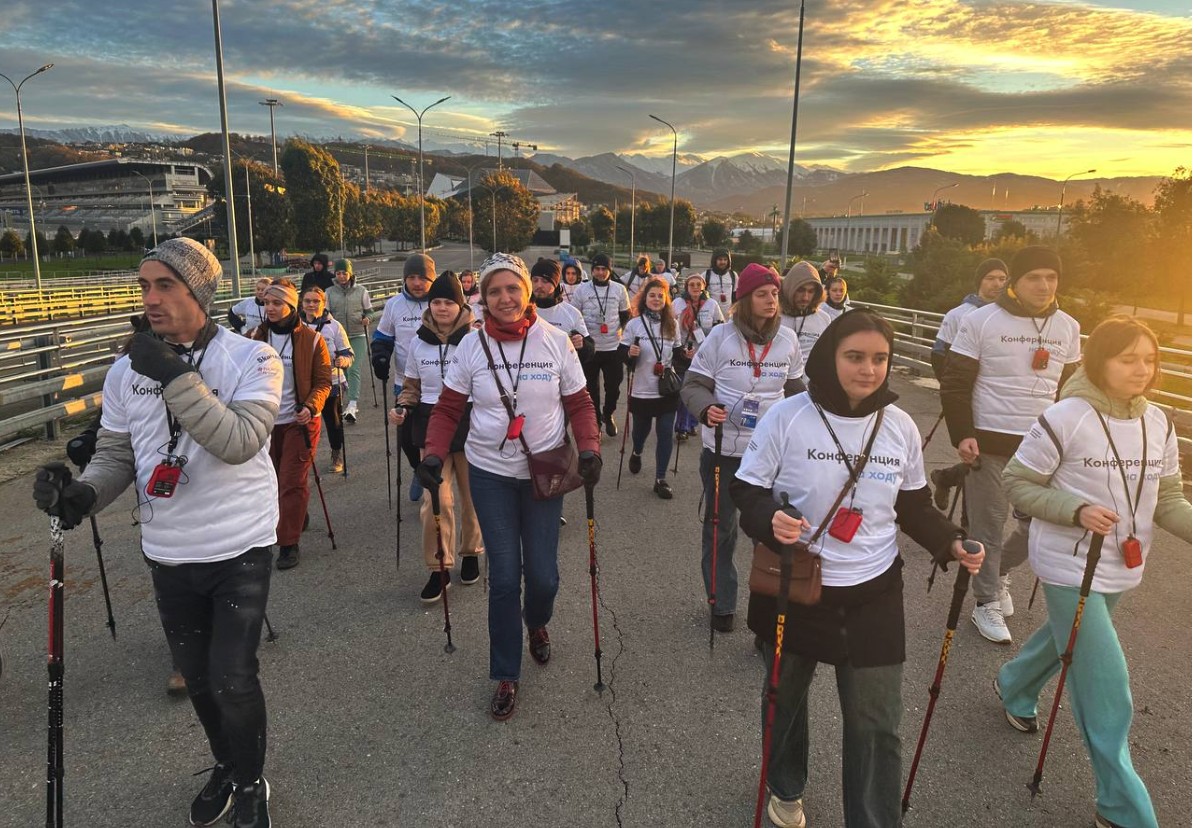On November 28-30, Skoltech took part in the third Congress of Young Scientists at the Sirius Science and Art Park in Sochi. A key event of the Decade of Science and Technology, the Congress is the largest platform bringing together basic science, frontier research, public authorities, and the real sector of the economy. Skoltech researchers and experts showcased their latest achievements at the Skoltech stand, joint public events, and held the “Thoughts in Motion” walking conference.
“The Congress is a landmark event for the new generation of scientists and innovators. This year, Skoltech is extensively represented both at the exhibition and in the business and cultural programs. For Skoltech, the event is a valuable opportunity to share expertise, attract ambitious talent, and be part of the academic and entrepreneurial community,” Skoltech’s Senior Vice President for Development Alexander Safonov noted.
Skoltech’s stand featured a whole panoply of research and technology projects: a pioneering Russian UAV robot capable of aerial flight, terrestrial locomotion, object manipulation, and the coordination of a drone swarm; elements of Russia’s first 5G base station; photonic integrated circuits for quantum communications; a phantom of the female reproductive system for ultrasound imaging and contrast agent testing; cathode materials made from mixed nickel, cobalt and manganese oxides; lithium-ion battery cells; and the CubeSat satellite. More exhibits were contributed by Skoltech Agro, Skoltech Bio, and Skoltech Materials. Skoltech Petroleum presented a model of a crater formed by a methane explosion in permafrost. The study was performed by a research team supervised by Leading Research Scientist Evgeny Chuvilin.
Skoltech also demonstrated the “Eat Polymer” project created by 13-year-old Yuri Melnikov, a seventh-grade student at the Skolkovo Gymnasium and one of the youngest participants in the Congress. “Smart feeders,” Yuri’s bio container that converts polyethylene into ethylene glycol and organics, are expected to help recycle plastic locally, while raising school students’ awareness of the global problem.
The stand also featured Skoltech’s media projects: popular science and analytical publications; “VR Kolmogorov,” a unique online project dedicated to the 120th birthday of the great mathematician; and “Listen to the Cities,” a collection of AI-generated soundtracks inspired by the unique features of 23 Russian cities included in VEB.RF’s Quality of Life Index.
On Wednesday, the scientists shared their research experience at the “Thoughts in Motion” Nordic walking conference in the Olympic Park. Associate Professor Yury Kostyukevich from Skoltech Bio explained how mass spectrometry helps fight doping in sports. Senior Research Scientist Mikhail Pugach from Skoltech Energy talked about vanadium-based industrial energy storage systems. Research Scientist Polina Rudakovskaya from Skoltech Photonics, who developed new materials for infertility diagnosis and treatment, shed some light on the intricacies of the ultrasound technology of the future. Mikhail Lebedev, an MSU professor and lead researcher at the Institute of Evolutionary Physiology and Biochemistry of RAS, focused on neural interfaces for rehabilitation. Senior Research Scientist Elena Mukhina from Skoltech Petroleum clarified how to obtain almost “green” hydrogen in oil and gas fields.

Yury Kostyukevich and participants of the “Thoughts in Motion” walking conference. Credit: Alisa Ivanitskaya
As part of the public program, Skoltech experts joined a discussion about how media projects can inspire scientific breakthroughs among young researchers, how science fiction can drive technology advancement, what young researchers in neurotechnology find the most inspiring, whether the Soviet science management model was successful or not, and much more.
On Tuesday, Alexander Safonov attended the session “Region of Beneficial Science: Regional Centers for the Commercialization of Scientists’ Research Results and Expertise,” which focused on the challenges that regional authorities and scientists are faced with when creating world-class campuses in Russia with their state-of-the-art equipment and comfortable working environment for students and young researchers. Alexander stressed that new campuses should be made visible to advanced teams of young researchers, and the sooner the better.
He added that for the laboratories to operate effectively, they should be designed with an eye to both the immediate needs of the industrial customer and the aspirations of young and successful researchers who can offer a clear vision of technology development for several years to come. Deputy minister of education and science of the Chelyabinsk Region Vitaly Litke praised Skoltech for its expertise and involvement in the design of the Chelyabinsk campus.
On Wednesday, the showcase session “Returning Scientific Cinema to the Big Screen: How to Make Popular Scientific Films” hosted the screening of “Phoenix” and “Superfly” — short documentaries made by young directors within the Science Film Laboratory 2.0 project and featuring researchers from Skoltech and MSU’s Department of Chemistry. The Scientific Film Laboratory 2.0 led by film director Yulia Kiseleva, a winner of the Russian “For Commitment to Science” award, aims to make science films more fictional and appealing to a broad audience.
Contact information:
Skoltech Communications
+7 (495) 280 14 81


